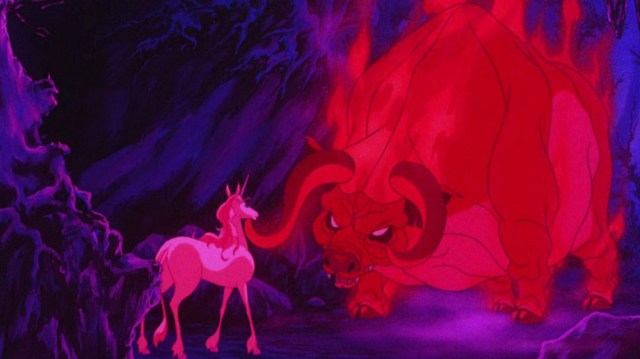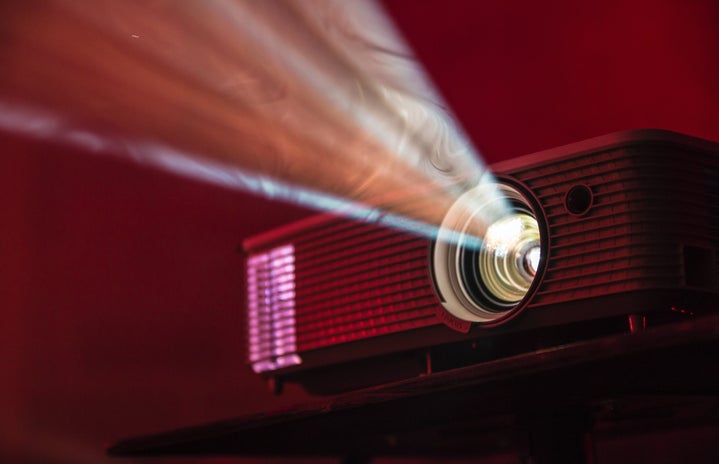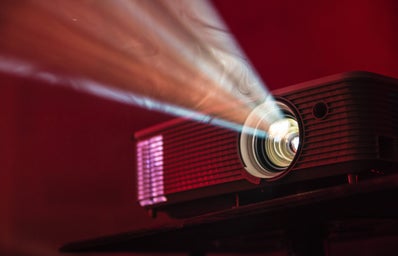
Jensen Farley Pictures
The Last Unicorn: A Forgotten Classic
I remember vividly, at the age of 5, getting a manicure, and telling my mom that I wanted a sparkly coat because it reminded me of unicorns. A lady behind me overheard me say “unicorns” and directed her attention to my mom, saying, “I think your daughter should watch this movie called The Last Unicorn.” A few days later, my mom found the DVD of it, and I immediately glued myself to the couch and watched it. The lady was right, I did love it. I mean, the whole focus of it was around a unicorn (at the time I was an avid believer in them), and so I thought that the Red Bull was real and that that was why we don’t see unicorns anymore. With my limited perspective, I took the movie at face value, a unicorn goes on a journey with people she finds along the way, to find more unicorns while trying to hide from the Red Bull. It wasn’t until many years later, in late adolescence, that I decided to rewatch it, and a whole new meaning took on light. The Last Unicorn wasn’t just a beautifully animated film, but an allegorical movie, in which, I feel, not enough people know about.
The Unicorn and the symbolism of innocence
The Unicorn remains unharmed through her ability to appear as a regular horse, without the horn, in the eyes of humans, specifically men. Near the beginning of the film, we see the “mare” lying in the grass as a man drives by his carriage, looking at her almost lustfully, but passing by, as if she is nothing but a regular horse. You could take this scene at [image of lying down without horn]
We can take this scene at face value or dive a little deeper; first from a feminist lens. The Unicorn protects herself by pretending to be something she is not. Like a red herring, her appearance strays the man away from what she is. You can interpret this into reality, in instances that women must lie about if they live alone, the significance of where they are going to their Uber driver, among other fibs that help foster a little more protection, whether it is an illusion of it or not.
However, referring to symbolism, the Unicorn can be translated as innocence, and the inability of the man to see her for what she is, is because he has lost all of it; he is no longer a believer in wonder but rather overshadowed by his day-to-day decisions.
Mommy Fortuna’s Unfortunate caravan
The Unicorn’s safety is interrupted by Mommy Fortuna, a witch who dabbles in illusionary magic, capturing regular animals and making them appear mythical to bring in some cash from gullible visitors. Fortuna places a false horn on the Unicorn’s head, an ironic illusion, only the visiting nun sees the Unicorn for who she truly is, signifying her belief both in spirituality and innocence. After a pleading argument, Mommy Fortuna insists the unicorn belongs to her, because she will keep her safe from the Red Bull, a manipulative statement that is soon destroyed, when Schmendrick, one of the caravan’s helpers, frees the Unicorn.
This point in the movie recognizes the differences between pride and one’s ability. Mommy Fortuna was a weak witch, whose pride was far higher than any talent she truly had. Her pride helped her sell her falsified caravan and ultimately became her destroyer when the Unicorn freed the Harpy (the other magical creature she had captured) and it attacked her. The Unicorn, who begged for her release, recognized that Mommy Fortuna could still be capable of being good; a believer. Though her attempt failed, and her freedom was won through an escape, the Unicorn’s good faith is parallel to the idea of innocence, she believes everyone has good in them, whether they choose to show it or not.
ScHmendrick And molly grue
The pair continue their journey until they stumble upon on a group of people of which Molly Grue is a part. After she separates from the group, she discovers the Unicorn and meets her with an adverse reaction. She is upset at the unicorn for not presenting herself earlier in Molly’s life, which can be understood that her early years must have been anything but nice and innocent. The unicorn consoles her as she begins to break down; ultimately she forgives the Unicorn and the trio continue to set forth on the path to find the Red Bull. As they set up camp close to the castle of the Red Bull, the beast senses the unicorn’s presence and begins to hunt her down, setting up for a climactic turn of events.
Metamorphosis: Unicorn to Lady Amalthea
I can never regret. I can feel sorrow, but it’s not the same thing.
The Last Unicorn (30:34)
In haste, Schemndrick turns the Unicorn into a human as a means to save her from the beast. Molly and Schmendrick bicker at his decision as the Unicorn, now Lady Amalthea, remains unconscious in her transition. Molly is enraged and believes that Lady Amalthea will “grow mad” in the human body because she is not meant to be anyone but a unicorn. In a way, her symbolism of innocence has been tainted, she is no longer a mythical creature, she is just like everyone else. Schmendrick claims that he could easily change it back, but everyone knows, including him, that it won’t be the same. Lady Amalthea has become human, if she returns to her original form, it would be impossible to stay the same.
Lady Amalthea’s disgust is expressed when she states “I wish you had let the Red Bull take me” after waking up. She would have preferred to be captured in her true form than to live out her life in a body.
As highlighted in the quote above, when Lady Amalthea was still a unicorn, she expressed to Schemndrick that there was no such concept of regret in her immortal existence; her kind was not born with it. However, as a human she embodies the pain and suffering that mortals feel, and therefore even after a successful transformation back to a unicorn, she understands she will never be like all the others; she is the only unicorn who can feel regret.
Final Takeaways From the Final Scene
As the trio and a newfound prince in the castle battle the Red Bull, victory is met as the newly transformed Unicorn lures the Bull into the ocean, where giant waves composed of all the other unicorns overtake it, and the huge herd trample the castle to the ground. The other unicorns have been found.
Everyone says their goodbyes and the unicorn parts back into the woods to meet with all the others, knowing that some part of her will always differentiate her from the rest of the unicorns.
In a bittersweet message, the power of believing is what ultimately called the other unicorns out from the ocean; they had believed in a chance to destroy the Red Bull once and for all.
All in all…
The Last Unicorn is a worthwhile watch for anyone. Produced in the 1980s, the animation style is comparable to that of early Disney animations, which personally are my favorite kind. Aside from the technical aspects, this movie serves as a great message and lesson to the viewer, oh also, unicorns??


